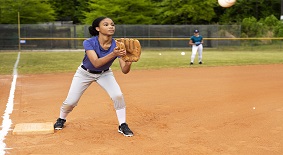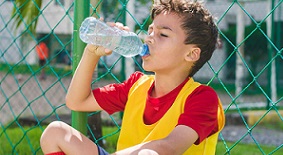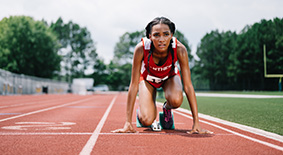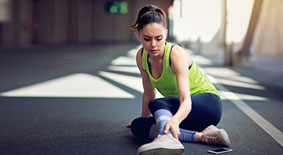How to Avoid 3 Types of Heat-Related Illness
Updated 4/5/21
Know the symptoms of dehydration, heat cramps, heat exhaustion and heat stroke in teen athletes, and get tips from our team of experts to avoid these heat-related illnesses.
Dehydration, heat cramps, heat exhaustion and heat stroke are the heat-related illnesses that may occur in your growing athlete if he isn’t prepared for playing outdoor sports in hot weather.
These illnesses can occur if your child overheats to the point where his body can no longer cool itself down, causing temperature spikes that could damage your teen’s brain or other organs.
At sports camps, summer practices and regular season activity in spring and fall, chances are your teen athlete will be exercising in scorching temperatures. It’s important that you—and your child—know the types and symptoms of these heat-related illnesses to keep your child safe and avoid a trip to the emergency department.
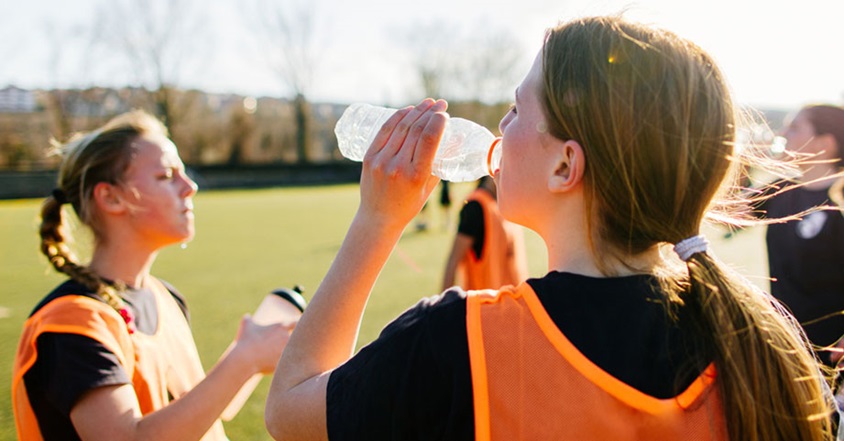
The first heat-related illnesses your teen athlete may experience are dehydration and heat cramps.
Most common symptoms of dehydration and heat cramps in kids and teens
- Thirst
- Fatigue
- Dizziness
- Light-headedness
- Muscle cramps
- Loss of energy
What to do when your child shows signs of dehydration and heat cramps
Athletes should take a break and drink water or a sports drink. Cramping muscles can be stretched and lightly massaged. Resume activity with caution only after all symptoms have cleared.
A growing athlete may be at risk for heat exhaustion if he displays the following symptoms:
- Dizziness
- Rapid pulse
- Headache
- Nausea
- Vomiting
- Chills
- Loss of coordination
- Excessive sweating
- Dry skin
What to do when your teen shows signs of heat exhaustion
Your teen should stop playing immediately and drink water or a sports drink. If he is unable to drink, he should be transported to a medical facility for intravenous hydration. If you are unable to check his core body temperature, you should take him to a medical facility for hydration and monitoring.
A growing athlete may be at risk of a heat stroke if he or she displays the following symptoms:
- Confusion
- Irrational behavior
- Drowsiness
- Nausea
- Vomiting
- Dangerously high temperature (104°F and above)
What to do if your teen has a heat stroke
Call 911 immediately. This is a life-threatening medical emergency that requires rapid cooling by immersion in an ice bath. Ice bags on the neck, arm pits and groin may help if a bath is unavailable.
Heat-related illnesses can be avoided if a growing athlete stays hydrated. Thirst is a poor indicator when determining whether a child or teen is dehydrated, so we recommend practicing the following to stay safe when it’s hot outside:
- Pre-hydrate 30 minutes before any sports activity. Kids should drink water until they are no longer thirsty and then drink another 8 ounces.
- Make sure your child has the right amount of water to drink for his weight during his practice or game:
- 5 ounces of water for every 20 minutes of activity for kids and teens weighing less than 90 pounds
- 8 ounces of water for every 20 minutes of activity for kids and teens weighing more than 90 pounds
- Make sure your child drinks water during an activity instead of pouring it on his head or face.
Water is best for hydration if the activity lasts less than one hour. For activities that last longer than an hour, your child can have a drink that contains carbohydrates and electrolytes. Beverages like Gatorade and Powerade were designed specifically for rehydration during exercise and contain the right amount of carbohydrates (about 6-8%). These are also good recovery drinks for kids when their games or practices end. You may also dilute a sports drink—one part sports drink to one part water—for a better taste.
We do not recommend drinking fruit juice or soda when exercising, as they contain too much sugar for effective hydration and can cause cramping. We also don’t recommend carbonated or caffeinated beverages, which may cause bloating. Caffeine can speed up metabolism, generating even more heat in your teen’s body.
“In addition to hydration, it is important that your athlete allow his body to acclimate to the heat by gradually working into physical activity,” says Ashley Brouillette, MD, a Sports Medicine Primary Care Physician at Children’s Healthcare of Atlanta. “Make sure your child slowly progresses into an activity and doesn’t jump into a practice or game when he hasn’t properly warmed up or stretched.”
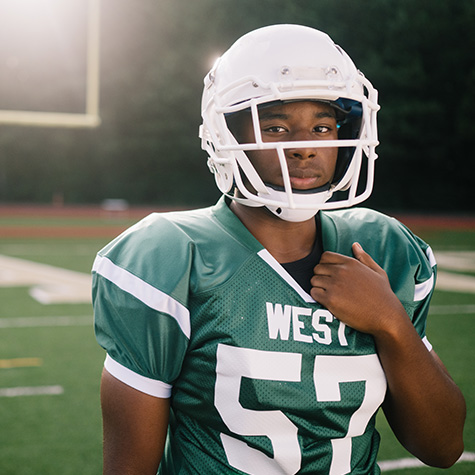
We are exclusively dedicated to kids and teen athletes.
The Sports Medicine Program at Children’s is one of the only programs in the country dedicated exclusively to caring for growing athletes. Our team is specially trained to care for teen athletes with sports-related injuries and illnesses.
Learn MoreKeeping Growing Athletes Healthy
Ashley Brouillette, MD, a Pediatric Sports Medicine Primary Care Physician in the Sports Medicine Program at Children’s Healthcare of Atlanta, specializes in the treatment of teen athletes. Dr. Brouillette completed her fellowship at Texas Children’s Hospital and served as Team Physician for Texas Southern University covering football, women’s soccer and women’s basketball. Dr. Brouillette acts as the team physician for Stockbridge High School and Hampton High School.
This content is general information and is not specific medical advice. Always consult with a doctor or healthcare provider if you have any questions or concerns about the health of a child. In case of an urgent concern or emergency, call 911 or go to the nearest emergency department right away. Some physicians and affiliated healthcare professionals on the Children’s Healthcare of Atlanta team are independent providers and are not our employees.
Contact Us 404-785-KIDS (5437)
